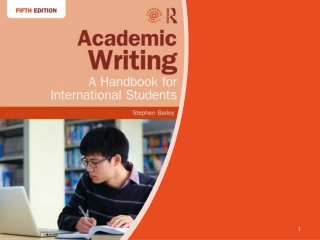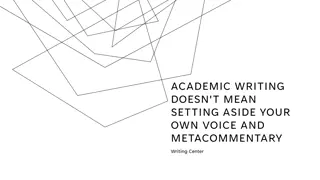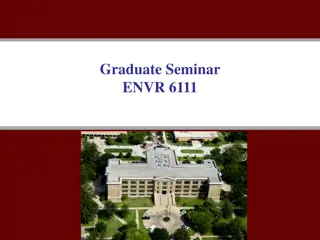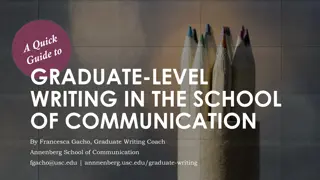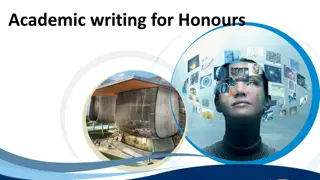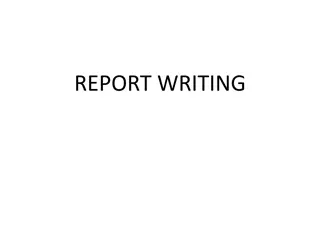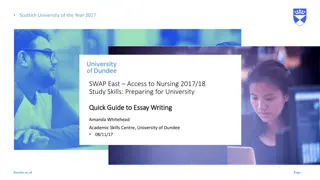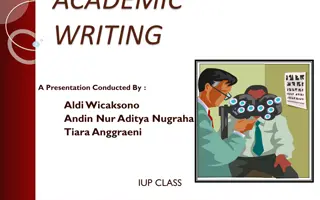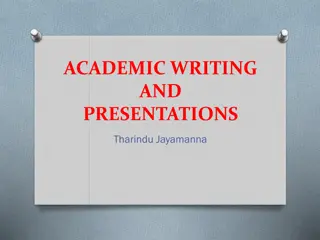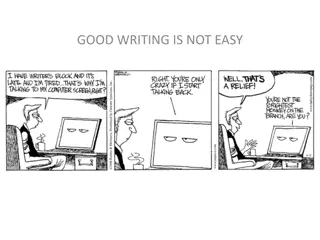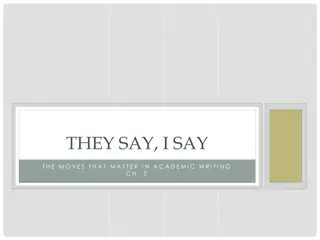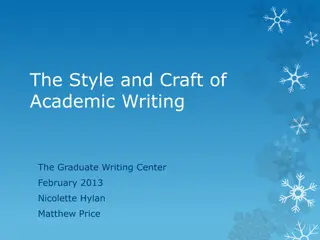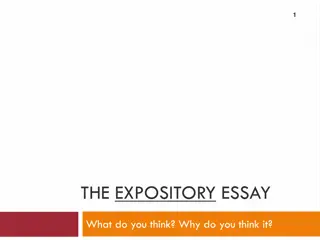Mastering Academic Writing: Strategies for Success
Academic writing is a formal style of writing with specific characteristics such as accuracy, brevity, and clarity. Understanding academic style is crucial for success in your course as it reflects your engagement with the content. Successful academic writers read, learn new vocabulary, and have a systematic approach to writing. Adopting a formal tone and following academic conventions are key strategies for effective academic writing. This guide provides tips to help you improve your academic writing skills and achieve success in your assignments.
Download Presentation

Please find below an Image/Link to download the presentation.
The content on the website is provided AS IS for your information and personal use only. It may not be sold, licensed, or shared on other websites without obtaining consent from the author. Download presentation by click this link. If you encounter any issues during the download, it is possible that the publisher has removed the file from their server.
E N D
Presentation Transcript
Academic writing & language www.kent.ac.uk/student-learning-advisory-service
Academic writing & language Academic writing & language Academic writing is a formal approach to assignments: Formal structure following academic conventions Formal tone and use of language Writing in an academic style is something that can be learnt through guidance and conscientious practice
The Importance of Academic Style The Importance of Academic Style Success on your course is determined by your understanding of course content and your discipline Your understanding is shaped by how you engage with course content Your engagement with course content is assessed by what and how you communicate in your assignments Academic writing style is the how
Characteristics of Academic Style Characteristics of Academic Style Think about it talk about it write about it Accuracy All the information you provide must accurately reflect the content of your source materials Brevity Keep it brief. Including a wide range of material, within your word count, means there s no room to go off-topic Clarity Make sure the content of your essay is easy for your reader to follow and understand.
Successful Academic Writers Successful Academic Writers Read Take notice of writing styles and conventions. Be influenced by the writers you enjoy reading. Read your work critically. Identify what you need to change to improve fluency edit and re-write it. Write Learn New vocabulary. Have a systematic approach to help you memorise unfamiliar terms.
Strategies for Academic Writing Strategies for Academic Writing Relevant Your writing should be clearly related to your essay question; make frequent references to the question. Develop a fluent narrative by linking the points you raise in a logically consistent way. Organised Follows academic conventions For essays: Introduction, middle section, conclusion. Include a range of perspectives. Fully referenced.
Formality Formality Adopt a formal voice Avoid trying to sound too clever or pompous Try to sound natural The slides which follow provide opportunities for you to make a judgment about appropriate academic style.
Too informal Formality Formality It s clear that the CEO of RBS s rushed decision to buy ABN Amro wasn t the smartest move. or The combination of a domineering chief executive, an overly compliant management team and a false sense of urgency were crucial in RBS s disastrous decision to acquire ABN Amro. or Too clever The synthesis of solipsism with sycophancy within RBS s climate of elusory exigency evinced an impolitic acquisition of ABN Amro.
Precision Precision Be specific how many? When? Avoid vague generalities Do not make things unnecessarily complex try to express ideas clearly. Don t use excessively long sentences or abstruse language! Provide specific details, aim for fluent, clear descriptions
Precision Precision Imprecise Many young people drink too much. Precise enough? or One in four 16-25 year-olds consume more alcohol than the Government s recommended weekly maximum. Too detailed? or Twenty three percent of people aged 16-25, consume >140ml of ethanol alcohol (C2H6O) per week.
Objectivity Objectivity Avoid narrow subjectivity not everyone will agree with your argument Structure your writing to show that you are questioning and analysing your sources Try to adopt a neutral voice, unless you are aiming for a clear and convincing conclusion
Objectivity Objectivity It is totally obvious that wealth needs to be distributed more fairly. Too emotive or It is clear from the above discussion that without greater redistribution of wealth, world economic growth will slow. Objective, but clear? or The accumulation of capital by a small segment of the population correlates negatively with GDP growth.
Clarity Clarity Write to inform, not to impress You may know what you mean, but will your reader? Avoid making value judgments let your reader decide, after considering the evidence you present
Clarity Clarity Equivocal There are quite a few reasons why micro-SMEs often fail during their first year of operating. or Clear There are three main reasons why micro-SMEs can fail during their first year of operating: lack of capital; external market factors; and poor business planning. Clear & argumentative or Whilst micro-SMEs can fail for a number of reasons during their first year of operation lack of capital, external market factors, etc. the most significant factor is inadequate and inaccurate business planning.
Signposting Signposting Helps your reader to follow your argument Clarifies and confirms your sources Consolidates the points you are making http://www.phrasebank.manchester.ac.uk/
Signposting Signposting Having discussed the scale of the problem, a possible solution can now be presented. Highlight transitions Highlight your sources Viewing this from the perspective of Smith s (2012) model, what becomes clear is that Whilst many studies have considered the relationship between profitability and environmental responsibility, few have done so from an ethnological perspective. Highlight your approach
Hedging Hedging Avoid over-confident, simplistic claims. There are (at least) two sides to every story Avoid being over-cautious. Say it how it is. If the evidence is inconclusive, you can state that further research is needed in the field
Hedging Hedging This proves that the banking crisis of 2007 was caused by subprime mortgages. Over-certain or This suggests that subprime mortgages were a key factor in precipitating the banking crisis of 2007. Over-cautious or This seems to suggest that subprime mortgages might possibly be partly responsible for some aspects of the banking crisis of 2007.
Explaining Yourself Fully Explaining Yourself Fully Helps your reader to understand Shows your reader that you understand Nurtures debate and reflection and avoids a soundbite style
Explain Yourself Explain Yourself Based on the above discussion, it seems reasonable to claim that Justification As Marx explained: the bureaucrat has the world as a mere object of his action (Marx 1843). What does this mean? As Marx explained: the bureaucrat has the world as a mere object of his action (Marx 1843). In other words, bureaucracy creates alienation and indifference to others Shows understanding
Writing is a Process Writing is a Process Improvement takes time and effort don t be hard on yourself, stay focused and keep practising! Make use of your feedback implement the necessary changes next time Re-read the essays you wrote last year. This will give you a clear sense of how your writing has improved.
Further resources Further resources For guidance on the broader range of academic skills that will help you succeed at university, please go to the SLAS webpages http://www.kent.ac.uk/student-learning-advisory-service where you can: Book a one-to-one appointment with a SLAS adviser Attend a range of Online Bitesize Skills Development sessions
Get in touch Get in touch SLAS CONNECT To book an appointment: www.kent.ac.uk/student-learning-advisory-service learning@kent.ac.uk SLASkent KentUniSLAS SLASkent


